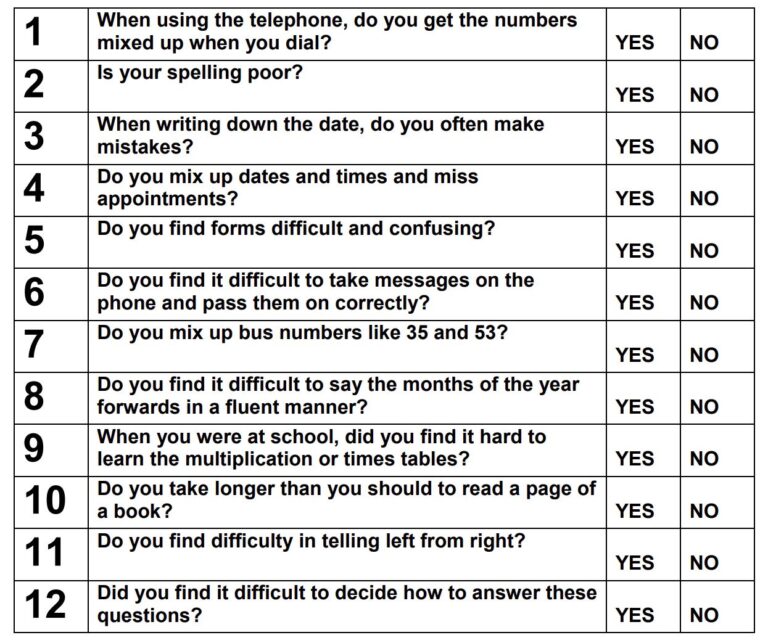
ARE YOU DYSLEXIC?
This checklist (ADO screening checklist – right click & save as) was developed in conjunction with Professor Tim Miles OBE of Bangor University following empirical research by Dr Ross Cooper of LLU+, London South Bank University. This checklist does not attempt to record the talents, skills or potential linked with dyslexia.
The checklist is organised around some of the key difficulties experienced by people with dyslexia in terms of reading, spelling, memory,
organisation and sequencing. A more formal assessment may confirm the presence of dyslexia.
to Download the ADO checklist right click save link as or click the link to open in a new tab ADO checklist
If you have done the checklist and think you may be dyslexic then contact us on the form below.
Revised Adult Dyslexia Organisation screening
Please answer Yes or No. Do not miss any questions out. If you are in any doubt, answer whichever feels like the truer answer.

This checklist was developed in conjunction with Professor Tim Miles OBE of Bangor University following empirical research by Dr Ross Cooper of LLU+, London South Bank University.
This checklist does not attempt to record the talents, skills or potential linked with dyslexia. The checklist is organised around some of the key difficulties experienced by people with dyslexia in terms of reading, spelling, memory, organisation and sequencing. A more formal assessment may confirm the presence of dyslexia.

Count the points for each YES answer e.g. 3 marks for question 1. Mark one box for each point scored to find your chance of being dyslexic.

This tells you how likely you are to be dyslexic. 1 in 7 is an above average chance.
Of course, it is always possible for you to be the 1 in 60 with a low score who is dyslexic, or the 1 in 4 with a very high score who is not dyslexic. Your own feelings about the matter can sometimes be more significant than the score.
This new version of the adult dyslexia screening has been piloted with a significantly larger sample than previous, across a wide range of educational experience. Results were compared with 140 people diagnosed as dyslexic. For the background research please see ADO’s website www.adult-dyslexia.org
Consequently, the screening benefits from:
1. a reduced number of questions, using the best indicators
2. weighting the value of the questions for more accurate screening
3. eliminating the questions which are out of date
4. clearer guidelines about the chance of being dyslexic
When you have completed the questionnaire:
If you feel that you may be dyslexic, you can contact the Adult Dyslexia Organisation for advice by filling out our form. Alternatively you can contact us using the details below:
Telephone: 07974755163
Email: do.dns@dial.pipex.com
Website: www.adult-dyslexia.org
You can also investigate a little further at:
www.outsider.co-uk.com/tryout.htm before seeking advice.
